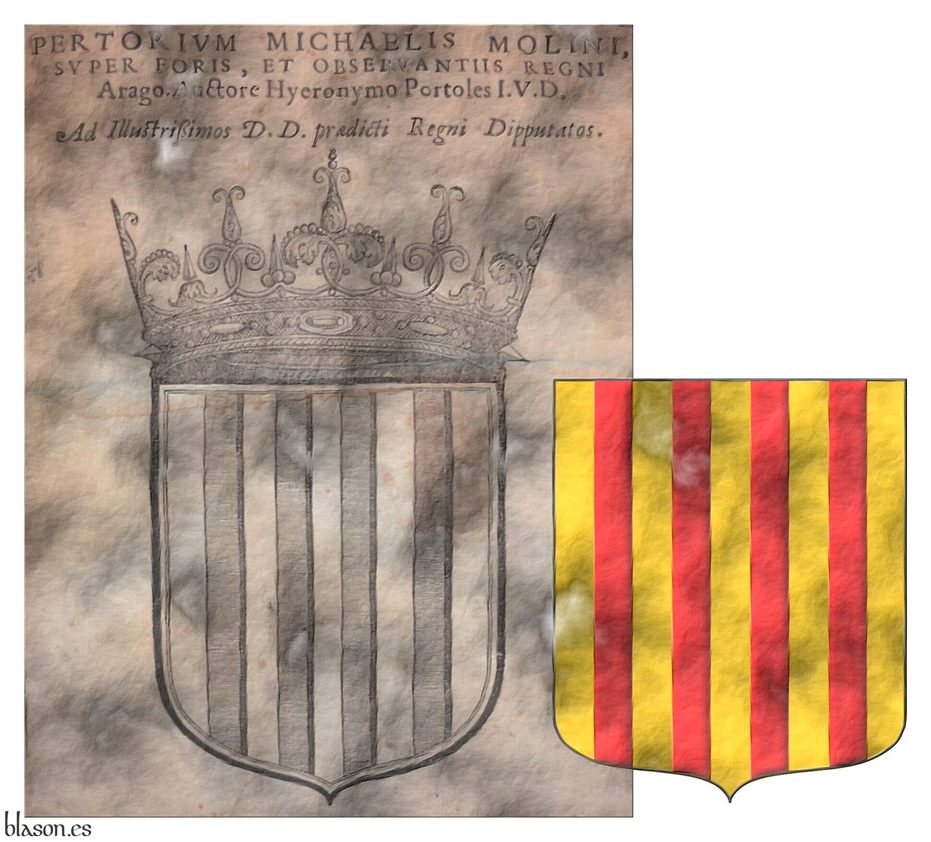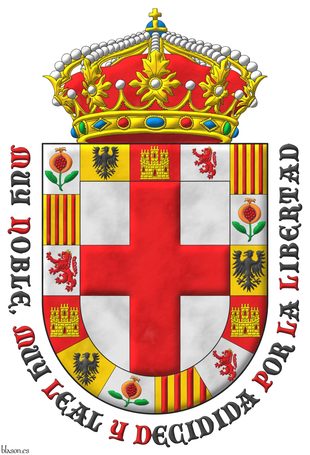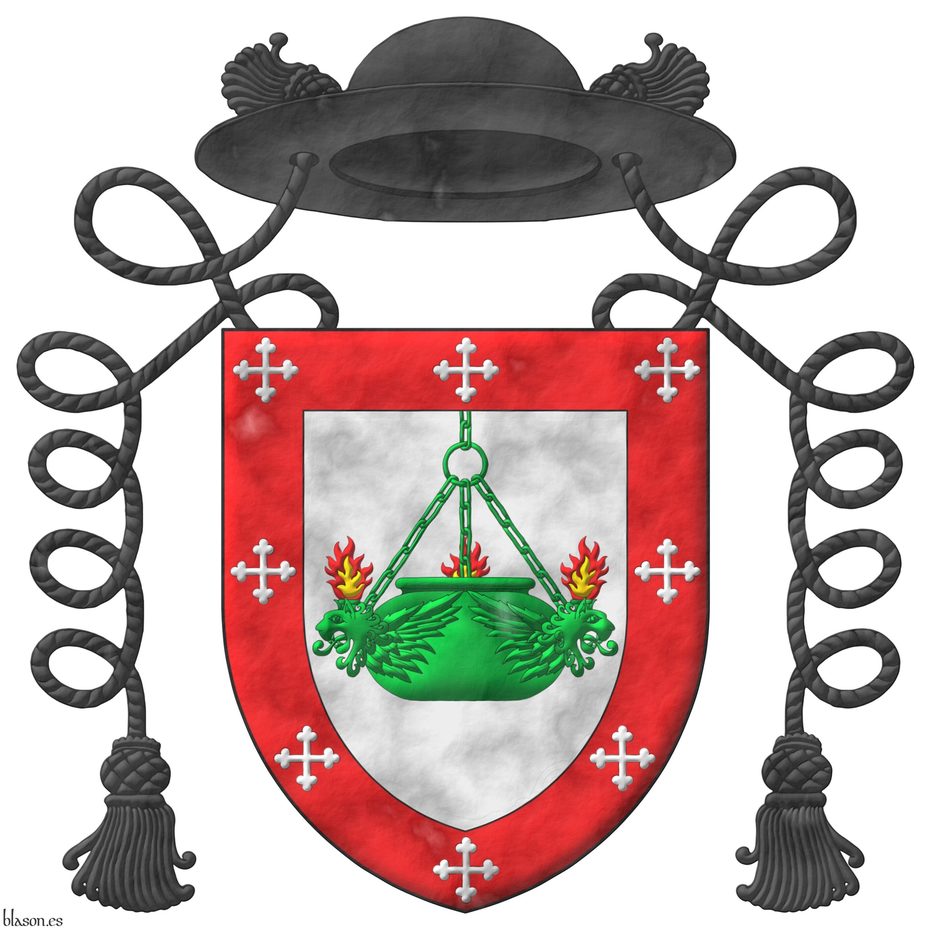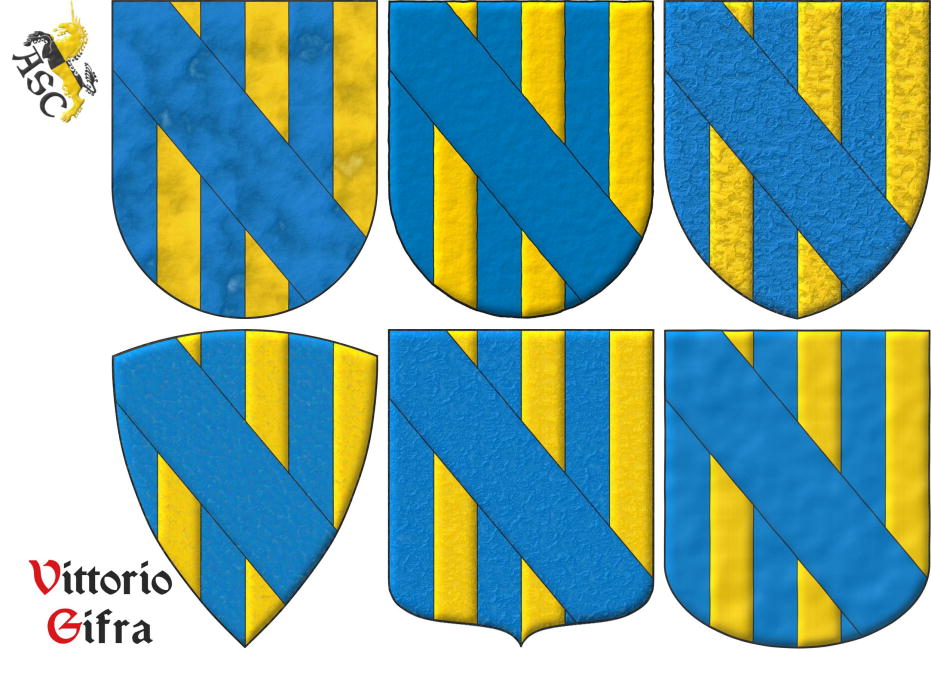Parchment

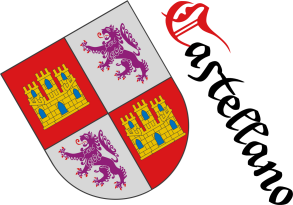
Aragon
Or, four pallets Gules.
Escudo de oro, cuatro palos de gules.
Recreated coat of arms of Aragón in the following manner: the escutcheon shape is pointed and rounded; the field is rendered in flat Or; the pallets are illuminated; and the whole has a parchment-like finish.
This rendition of the coat of arms is based on [Portolés, J.; Molino, M. del; 1590].
Blazon keywords: Without divisions, Or, Four, Pale and Gules.
Style keywords: Ogee, Illuminated and Parchment.
Classification: Interpreted, Civic, Coat of arms and Kingdom of Aragon.
Bearer: Aragon.


City of Almeria, structured and parallel blazons
Coat of arms of the city of Almeria, Andalusia, emblazoned by me, with the blazon written in English and Castilian in a structured way to observe the parallelism between both forms. Starting from the section at the dexter chief as number 1, I number the sections of the bordure clockwise. In this particular case, as in others where the number of different charges is an exact divisor of the total number of sections, the numbering coincides even if counted counterclockwise.
Blazon keywords: Argent, Gules, Or, Sable, Vert, One, Four, Fifteen, Cross, Bordure, Compony, Pomegranate, Slipped, Leaved, Proper, Eagle, Castle, Triple-towered, Port and windows, Masoned, Lion, Rampant, Crowned, Pallet, Closed royal crown, Crown, Motto and Scroll.
Style keywords: Outlined in sable, Illuminated, Semi-circular and Parchment.
Classification: Civic, Interpreted, Structured and parallel blazons, Boa and Coat of arms.
Bearer: Almeria, city of.


Crown of Yaroslav Pototsky
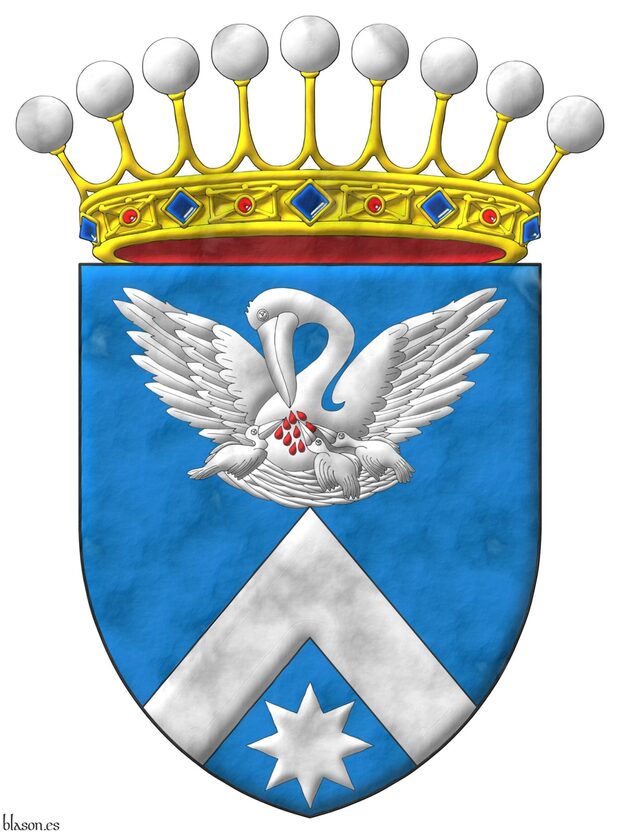
Azure, a chevron in base ensigned by a pelican in her piety Argent, vulned Gules, in base a mullet of eight points Argent. Notice the nest must touch the chevron abased. Crest: a crown of Count.
Coat of arms depicted by me, illuminated with lights and shadows, contoured in Sable, with a pointed external shape and with a parchment finishing.
Coat of arms of Yaroslav Pototsky emblazoned by me under his directions.
Blazon keywords: Azure, Argent, Gules, One, Chevron, In base, Pelican in her piety, Pelican, Vulned, Mullet, Crest, Crown of Count and Crown.
Style keywords: Outlined in sable, Illuminated, Pointed and Parchment.
Classification: Personal, Interpreted, Boa and Coat of arms.
Bearer: Pototsky, Yaroslav.


Diego Pantaleone Spanò
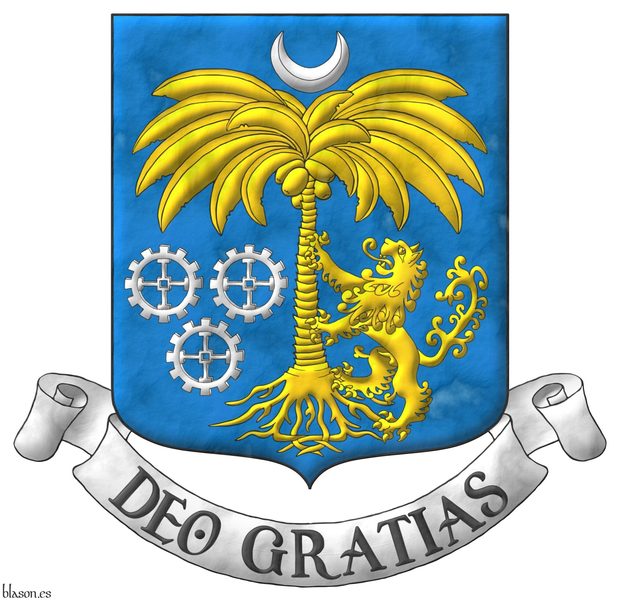
Azure, a palm tree eradicated, between in sinister a lion rampant supporting it Or, in dexter three millwheels, 2 and 1, and in chief a crescent Argent. Motto: «Deo gratias».
Escudo de azur, una palmera arrancada, acompañada a la siniestra de un león rampante empinado a ella ambos de oro, a la diestra de tres ruedas de molino, 2 y 1, y en jefe un creciente todo de plata. Lema: «Deo gratias».
Blazon keywords: Azure, One, Palm tree, Tree, Erased, Between, Sinister, Lion, Rampant, Supporting, Or, Dexter, Three, Millwheel, Ordered, In chief, Crescent, Argent and Motto.
Style keywords: Ogee, Outlined in sable, Illuminated and Parchment.
Classification: Personal, Interpreted, Coat of arms and Latin language.
Bearer: Spanò, Diego Pantaleone.


Heraldic device of Peter Iacobucci
Argent, a suspended oil lamp of three lions' heads erased and winged Vert, two heads visible, enflamed proper; a bordure Gules, charged with eight crosses botonny Argent. Crest: A galero with two cords, one on each side, each with a tassel Sable.
Arms emblazoned by me, highlighted with lights and shadows, contoured in Sable, with a pointed outer contour and with a parchment finish.
Blazon keywords: Argent, Vert, Gules, Sable, One, Three, Two, Eight, Suspended, Oil lamp, Lion, Head, Erased, Winged, Visible, Enflamed, Proper, Bordure, Charged, Cross botonny, Crest, Galero, Cord and Tassel.
Style keywords: Outlined in sable, Illuminated, Pointed and Parchment.
Classification: Religious, Interpreted, Boa and Coat of arms.
Bearer: Iacobucci, Peter.


![Ver [Kimon Andreou Idtg Blog] en enlaces recomendados. Áncora de oro y la divisa enlace.](../css/Ancora.Enlace.png)
Kimon Andreou Idtg Blog
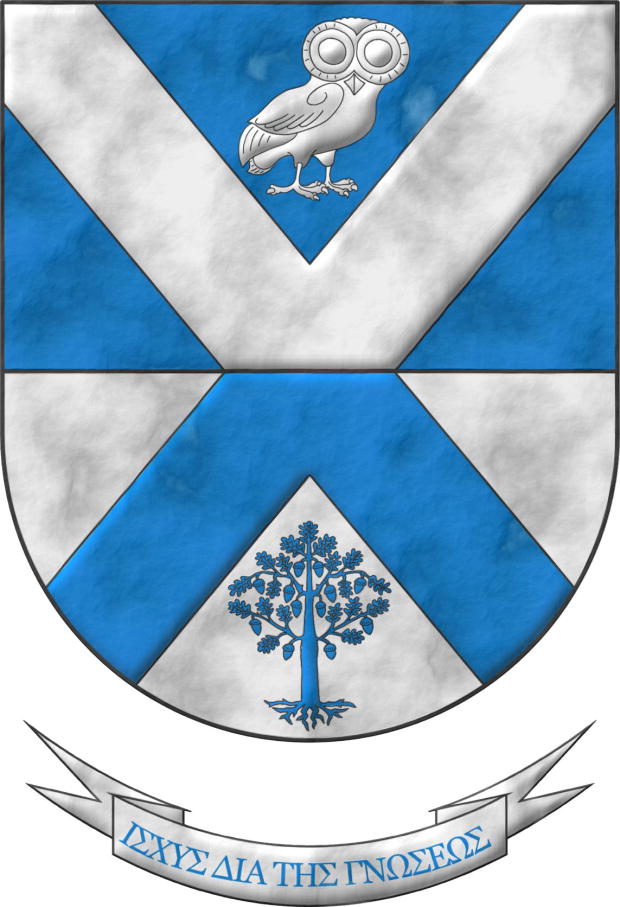
Kimon Andreou edits, from November 2008 to July 2015, his interesting idtg.org on heraldry, genealogy, history and other related topics.
The name and domain of this blog idtg.org are the acronyms of Kimon Andreou's own Greek motto which says:
- «Ischys Dia Tis Gnoseos»,
- in Greek «ΙΣΧΥΣ ΔΙΑ ΤΗΣ ΓΝΩΣΕΩΣ»,
- which could be translated into Castilian as «el poder del conocimiento».
This motto has led him to seek knowledge since he was young and he offers it to us with his enjoyable posts about biographies, books on heraldry, coats of arms that generate controversy, on how to design your own coat of arms (gentilitian), heraldic artists, nobility, orders of chivalry and merit, orthodox orders and many other topics that I recommend.
Categories: Link, Interpreted, Personal, Coat of arms, Party per fess, Parchment, Illuminated, Outlined in sable, Heraldry and heralds, Azure, Argent, Saltire, Overall, Counterchanged, Barn owl, Regardant, Tree, Oak, Erased and Motto.
Root: Andreou, Kimon.


Lindsay of Scotland, lineage
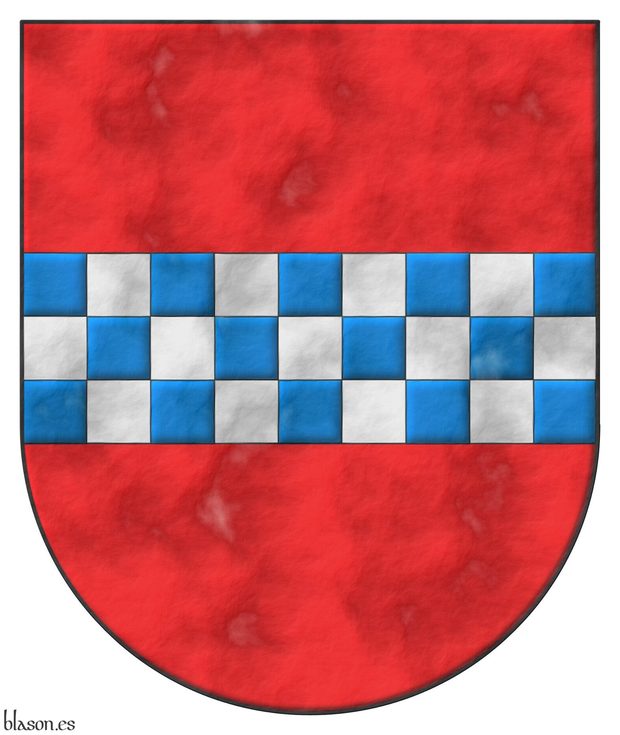
Gules, a fess chequey Azure and Argent.
Escudo de gules, una faja ajedrezada de azur y plata.
Arms depicted by me, highlighted with lights and shadows, outlined in Sable, with a semi-circular external shape and with a parchment finishing.
Coat of arms of the lineage Lindsay of Scotland. I have emblazoned it with a fess chequy of 3 rows, symmetric and with 9 columns of squares, provided that its height is 1/3 of the width of the coat of arms.
Blazon keywords: Gules, Azure, Argent, One, Three, Nine, Fess and Chequey.
Style keywords: Outlined in sable, Illuminated, Semi-circular and Parchment.
Classification: Personal, Lineage, Interpreted, Boa and Coat of arms.
Bearer: Lindsay of Scotland, lineage.
Blazon equivalent to: Janovsti of Janovic of Czechia, lineage.


Lloscós y Soldevilla, Guilaberto
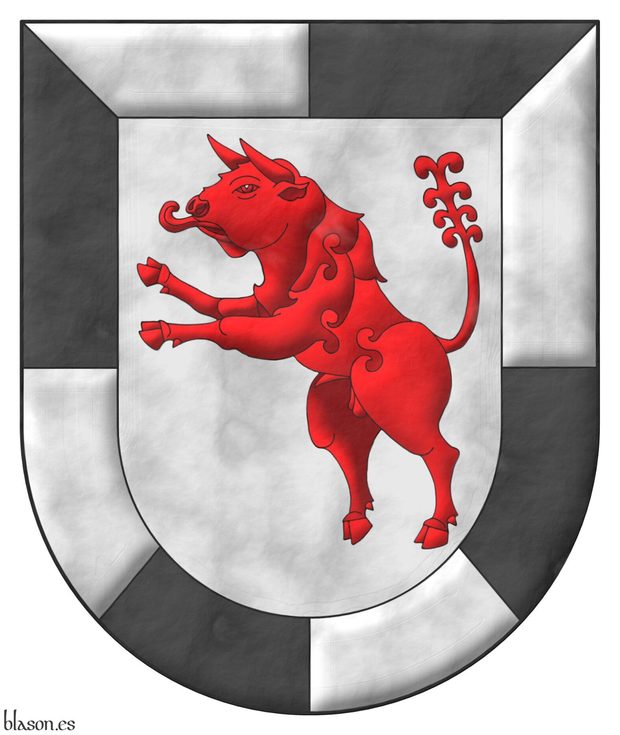
Guilaberto Lloscós y Soldevilla was grand prior of the Order of Saint John from 1449 to 1460.
Argent, a bull salient Gules within a bordure gyronny Argent and Sable.
Escudo de plata, un toro saltande de gules; bordura jironada de plata y sable.
Illuminated and parchment finishing.
He also known as Guilaberto Loscós y Soldevilla, and his coat of arms can be consulted at [García Carraffa, A.; García Carraffa, A.; 1968; volume II, page 407], who does not depict this bull with its tongue out.
The Lloscós lineage resided on the island of Mallorca and succeeded in the position of royal procurator of the island. Lázaro Lloscós was the procurator of the island in 1332, his son Mateo Lloscós was in 1392 and his grandson Mateo Lloscós was too. Mateo Lloscós helped King Alonso V of Aragon, the Magnanimous, with the expenses of the Naples campaign in 1435 and, therefore, the king donated the town of Bañalbufar and the title of baron. Mateo Lloscós was the father of Guilaberto Lloscós y Soldevilla grand prior of the Order of Saint John.
Bordure gyronny and bordure compony
This bordure presents a dual characteristic. It could be considered a bordure compony because it is composed of a series of segments, in this case, eight. However, since the sides of these segments are not perpendicular to the bordure, but are angled in such a way that all their extended lines would converge at the exact center of the coat of arms, it structurally resembles the division known as gyronny. It is for this reason that, despite its compony appearance, I specifically designate it as a bordure gyronny.
The tongue out
This is a reflection on the tongue out in animals in heraldry. I will rely on the representations found in [Fox-Davies, A. C.; 1909], as it contains numerous representations of animals in the most diverse heraldic attitudes.
In heraldry, tigers [Fox-Davies, A. C.; 1909; figures 322-325], lions, wolves, the bear, etc., are usually represented with the tongue out; they are heraldic beasts and they are carnivores.
However, the fox in [Fox-Davies, A. C.; 1909; figures 343-345] is not painted with the tongue out. It is classified as a heraldic beast and, moreover, it is carnivorous.
The boar is omnivorous, it is a heraldic beast and it is painted with the tongue out, as is done in [Fox-Davies, A. C.; 1909; figures 353-358].
From the above, there is no uniform association between the tongue out and being a heraldic beast or a carnivore.
On the other hand, [Fox-Davies, A. C.; 1909; figures 446-449] classifies eagles as birds, not as beasts; they are carnivorous and are represented with the tongue out. And the dolphin is a fish, it is carnivorous and is also represented with the tongue out [Fox-Davies, A. C.; 1909; figures 479-480].
There are heraldists who say that herbivores are not painted with the tongue out.
But donkeys, mules, and especially the horse are herbivores and they can be seen represented with the tongue out. For example, [Fox-Davies, A. C.; 1909; figures 360 and 362] paints the horse with the tongue out, and in figure 361, with the horse running, he does not paint the tongue out. In no case does he classify it as a heraldic beast.
[Fox-Davies, A. C.; 1909; figures 368 and 370] paints the talbot, the mythical dog of heraldry, with the tongue out rampant and passant; but in more restful attitudes, such as standing and seated, he does not paint it with the tongue out. This could indicate that, when it is calm, it does not put the tongue out. But in the previous paragraph we have seen that he does not paint the horse running with the tongue out, and a horse running is not calm.
The bull [Fox-Davies, A. C.; 1909; figures 375-376] is not painted with the tongue out. However, I paint the bull with the tongue out and, although herbivorous, I claim the fighting bull as one of the most beastly figures of heraldry.
The stag does not carry the tongue out in any of its attitudes in [Fox-Davies, A. C.; 1909; figures 379-386], and other cervids [Fox-Davies, A. C.; 1909; figures 387-390] do not either.
Rams, sheep, lambs, goats [Fox-Davies, A. C.; 1909; figures 395-403] also do not carry the tongue out.
The badger is carnivorous [Fox-Davies, A. C.; 1909; figure 409]; as with the fox, it is carnivorous and does not carry the tongue out.
Therefore, in general, the tongue out cannot be fully associated either with heraldic beasts or with carnivores, just as not carrying the tongue out cannot be associated with herbivores or with calm attitudes. For example, the lion always carries the tongue out, even in its calmest attitudes [Fox-Davies, A. C.; 1909; figures 304-309].
The conclusion is that it is left to the discretion of the heraldic artist to paint or not to paint the tongue out, depending on what he wishes to express. For example, greater aggressiveness, greater movement, or liveliness could be associated with the tongue out.
Blazon keywords: Argent, One, Bull, Salient, Gules, Bordure, Gyronny and Sable.
Style keywords: Parchment, Outlined in sable and Illuminated.
Classification: Personal and Interpreted.
Bearer: Lloscós y Soldevilla, Guilaberto.


McCartney, Michael
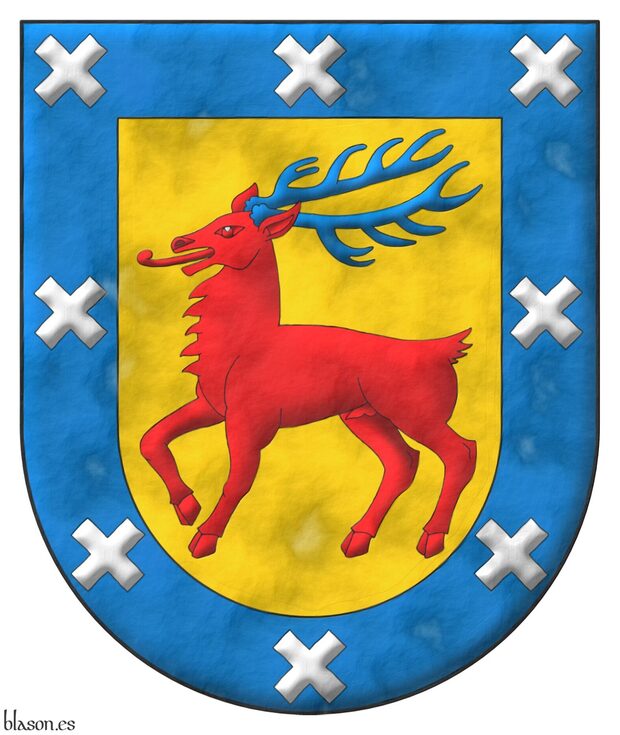
Or, a stag trippant Gules, attired Azure; a bordure Azure charged with eight saltires couped Argent.
Escudo de oro, un ciervo pasante de gules, acornado de azur; una bordura de azur cargada con ocho sotueres de plata.
Coat of arms interpreted and emblazoned by me with with a semi-circular ended shape, illuminated, and with a parchment finishing.
Blazon keywords: Without divisions, Or, One, Stag, Tripant, Gules, Attired, Azure, Bordure, Charged, Eight, Saltire and Argent.
Style keywords: Parchment, Outlined in sable, Illuminated and Semi-circular.
Classification: Interpreted and Coat of arms.
Bearer: McCartney, Michael.


Odysseus of Ithaca
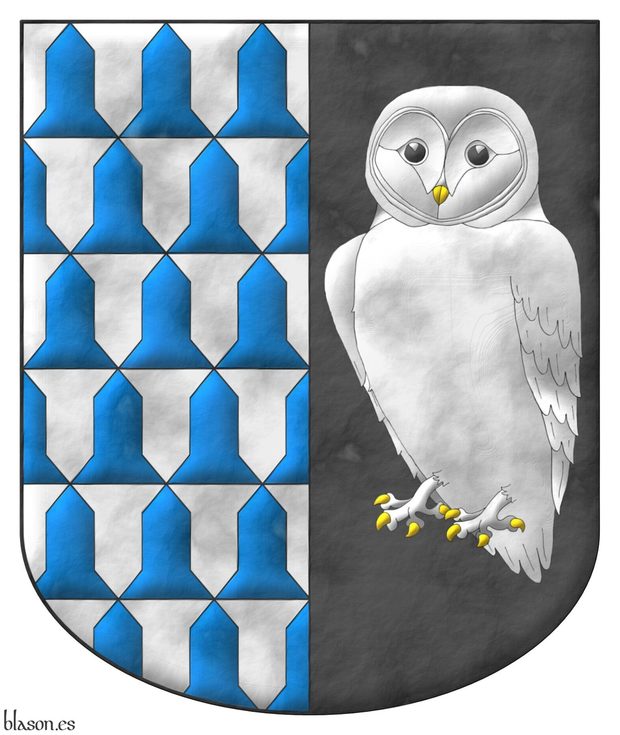
Party per pale: 1 Vair; 2 Sable, a barn owl Argent, the eyes Sable, beaked and armed Or.
Escudo partido: 1o de veros; 2o de sable, una lechuza de plata, encendida de sable, picada y armada de oro.
Blazon keywords: Party per pale, Argent, Azure, Vair, Sable, Or, Barn owl, The eyes, Beaked and Armed.
Style keywords: Rounded, Illuminated, Outlined in sable and Parchment.
Classification: Created, Imaginary, Coat of arms and Greco-Roman antiquity.
Imaginary bearer: Odysseus of Ithaca.


Philip III of France
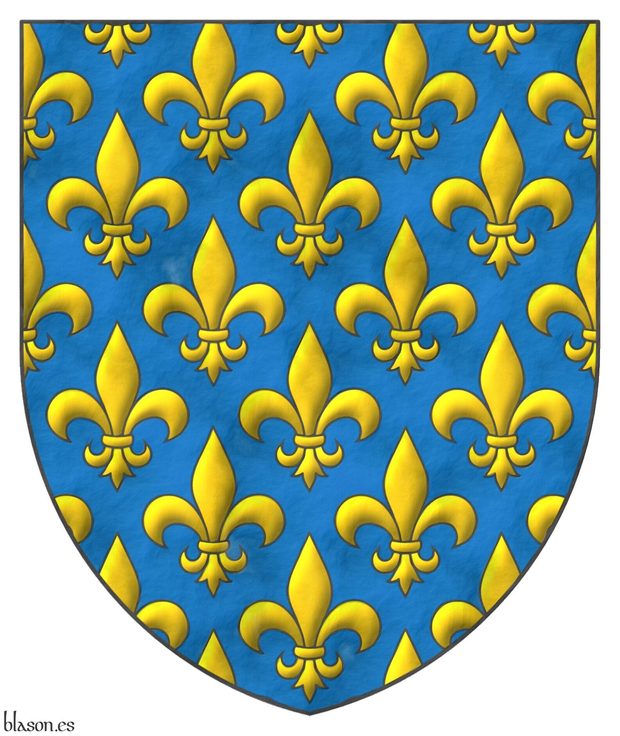
King of France from 1270 to 1285, grandson of Blanche of Castile.
Azure semé of fleurs de lis Or.
Escudo de Azur sembrado de flores de lis de oro.
Coat of arms interpreted with: a pointed base; the field enamelled in flat Azure; the fleurs-de-lis illuminated in Or and outlined in Sable; and finished with a parchment effect.
During his reign, it is believed that the second part of the armorial [Wijnbergen; 1265] was completed, which ends with the coats of arms of several kings, many of them European, beginning this series with the coat of arms of the King of France himself, [Wijnbergen; 1265; shield no. 1,288], which has served as the inspiration for the one recreated here.
Blazon keywords: Without divisions, Azure, Or, Semé and Fleur de lis.
Style keywords: Pointed, Illuminated, Outlined in sable and Parchment.
Classification: Interpreted, Personal, Coat of arms, Kingdom of France and House of the Capetians.
Bearer: Philip III of France.


Royal Spanish Academy, coat of arms
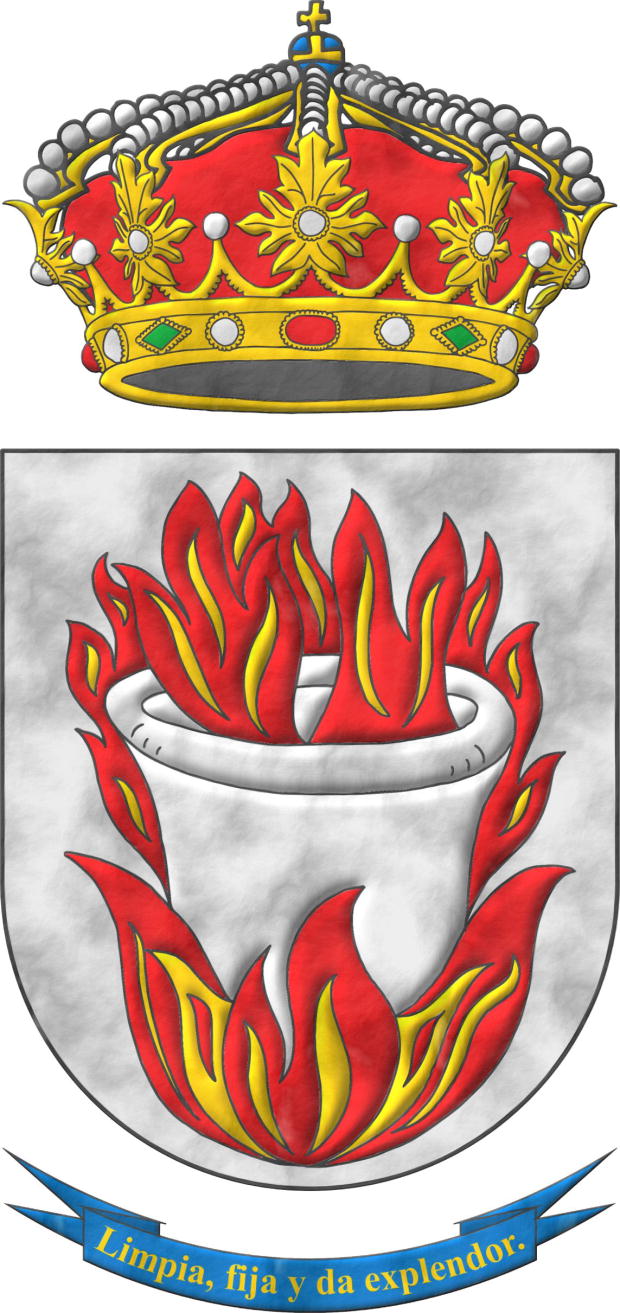
Argent, a crucible Argent, enflamed and on a bonfire hoguera Gules and Or. Crest: A closed royal crown Or, with eight arches, visible five. Motto: «Limpia, fixa, y da esplendor» Or over a scroll Azure.
Escudo de plata, un crisol de plata, llameante y sumado a una hoguera de gules y oro. Timbrado de una corona real cerrada. Lema: «Limpia, fixa, y da esplendor» de oro sobre una filacteria de azur.
Interpretation made from the Royal Academy emblem: transforming it into a semicircular-based shield, instead of its oval shape; with its motto on a scroll beneath the base, instead of surrounding it; keeping the closed royal crown in its place; with everything illuminated except the field which is in plain color; and the whole outlined in sable and with a parchment-like finish.
In this interpretation, on the Argent field, the Gules fire of the bonfire completely surrounds the Argent crucible, to avoid the metal Argent on the same.
To write the blazon for this coat of arms I use the heraldic term «llameante». Therefore, I do not follow [Avilés, J.; 1780a; page 82 and figure 163] when he writes «...y un Fénix de gules sobre una hoguera encendida de lo mismo.». He uses this example to illustrate the 2 fundamental uses of the term «encendido» which is said when «the Eyes of animals... are of a different color» and «also of a burning Bush and the same for a Torch, when the flame is of a different tincture».
Blazon keywords: Without divisions, Argent, One, Crucible, Enflamed, Bonfire, Gules, Or, Closed royal crown, Crown, Motto, Scroll and Azure.
Style keywords: Semi-circular, Illuminated, Outlined in sable and Parchment.
Classification: Interpreted, Socioeconomic and Coat of arms.
Bearer: Royal Spanish Academy.


Sancho IV of Castile, open royal crown
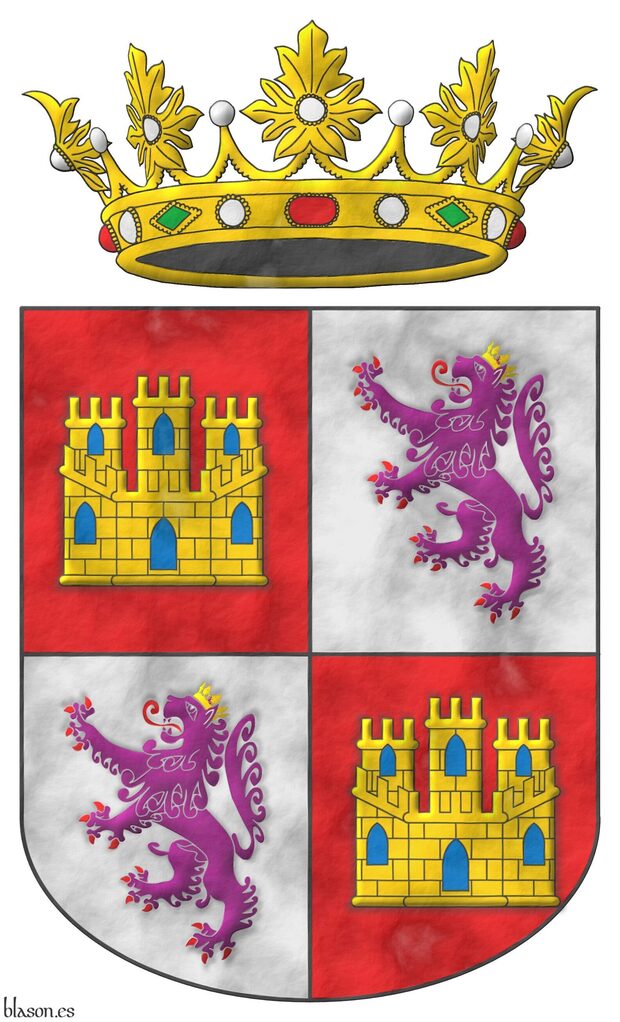
Son of Alfonso X of Castile and Violant of Aragon.
Quarterly: 1 and 4 Gules, a castle triple towered Or, port and windows Azure, masoned Sable; 2 and 3 Argent, a lion rampant Purpure, armed and langued Gules, crowned Or. Crest: An open royal crown Or.
Escudo cuartelado: 1o y 4o de gules, un castillo de oro, aclarado de azur, mazonado de sable; 2o y 3o de plata, un león rampante de púrpura, armado y lampasado de gules, coronado de oro. Timbrado de una corona real abierta.
Arms of the king interpreted by me as follows: the shield of arms has a rounded (semicircular) base; the quarters are in flat tinctures Argent and Gules; the castles, lions and crown are illuminated; the castles and lions are shaded; and the whole has a parchment finish.
Blazon keywords: Quarterly, Gules, Or, Azure, Sable, One, Castle, Port and windows, Masoned, Argent, Purpure, Lion, Rampant, Armed, Langued, Crowned, Crest, Open royal crown and Crown.
Style keywords: Rounded, Illuminated and Parchment.
Classification: Interpreted, Personal, Coat of arms and Kingdom of Castile and Leon.
Bearer: Sancho IV of Castile.


Sir Robert Knollys (1325-1407), second post
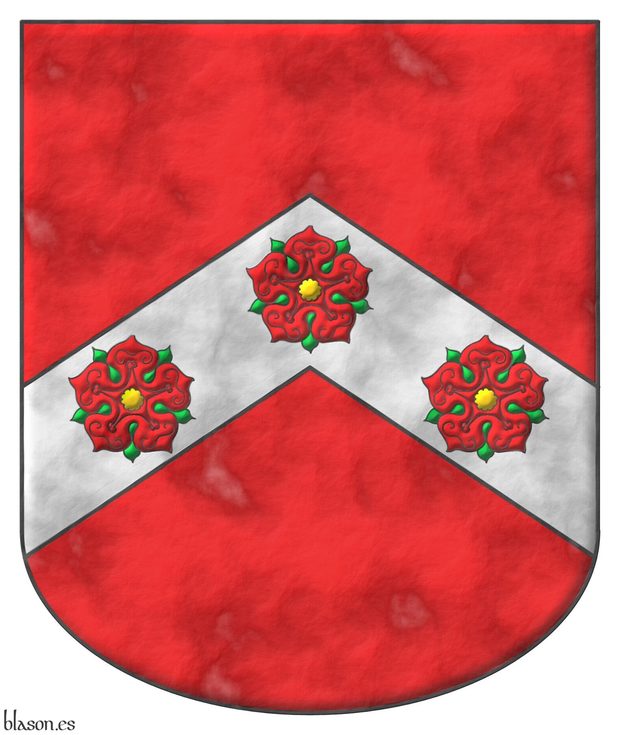
Sir Robert Knollys ~ Sir Robert Knolles (1325-1407).
Gules, on a chevron Argent three roses Gules, barbed Vert and seeded Or.
Escudo de gules, un cabrio de plata cargado de tres rosas de gules, barbadas de sinople y botonadas de oro.
Coat of arms interpreted as follows: the mouth is rounded; the field is illuminated in Gules; the chevron is outlined in Sable and illuminated in Argent metal; the roses outlined in Sable are illuminated the petals in Gules, the leaves in Vert and the central button in Or; and the whole has a parchment finish.
Robert Knolles participated in the Hundred Years' War, on the side of England, and in 1367, he was with Edward of Woodstock, the Black Prince, at the Battle of Nájera.
In the Battle of Nájera, on the way to Navarrete, Pedro I of Castile, with direct English support, and his half-brother Don Enrique de Trastámara, with indirect French support, faced each other. English and French hoped that supporting their side's victory would allow them to have the Castilian fleet on their side, which was more powerful than theirs, in their Hundred Years' War.
Blazon keywords: Without divisions and Gules.
Style keywords: Rounded, Illuminated, Outlined in sable and Parchment.
Classification: Interpreted, Personal, Kingdom of England and Army and Navy.
Bearer: Knollys, Robert.


Sir Thomas Grenville II
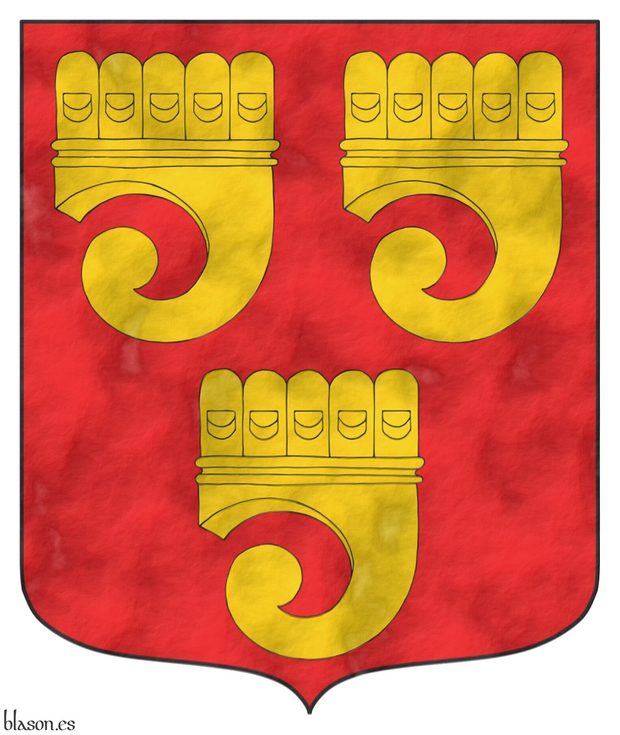
Gules, three Clarions Or.
Plain tinctures and parchment finishing.
This wind musical instrument appears at [Académie internationale d'héraldique; 1952; figura 476] as «claricord» and also «clarion», I like more this second name.
The clarion is also called «clarichord», «sufflue» or «rest». Then other alternative blazons for this coat of arms could be «Gules, three Claricords Or», «Gules, three Clarichords Or» or «Gules, three Sufflues Or».
Blazon keywords: Without divisions, Gules, Three, Clarion and Or.
Style keywords: Parchment, Outlined in sable and Plain tincture.
Classification: Interpreted and Kingdom of England.
Bearer: Grenville, Thomas.


Universitas Studiorum Navarrensis
![Universitas Studiorum Navarrensis Emblem Azure, Saint Michael Argent, vested and nimbed Or, grasping in his dexter hand a spear Or, point downward, and in his sinister hand bearing [ Gules, a chain orlewise, crosswise, and saltirewise Or, charged in the fess point with an emerald Vert, of Navarre ], upon a dragon Vert, armed, langued, fanged, and the eyes Gules. Motto: «Universitas Studiorum Navarrensis».](../escudo_armas/UnavN.22.SanMiguel.Oro.Vestido.Plata.jpg)
Emblem Azure, Saint Michael Argent, vested and nimbed Or, grasping in his dexter hand a spear Or, point downward, and in his sinister hand bearing [ Gules, a chain orlewise, crosswise, and saltirewise Or, charged in the fess point with an emerald Vert, of Navarre ], upon a dragon Vert, armed, langued, fanged, and the eyes Gules. Motto: «Universitas Studiorum Navarrensis».
Emblema de azur, un San Miguel de plata, vestido y nimbado de oro, teniendo en su diestra una lanza de oro, con la punta hacia abajo y en su siniestra trae [ escudo gules, una cadena puesta en orla, en cruz y en sotuer de oro, cargada en el centro de una esmeralda de sinople, de Navarra ], sostenido por un dragón de sinople, armado, lampasado, fierezado y encendido de gules. Divisa: «Universitas Studiorum Navarrensis».
Emblem interpreted as follows: oval in shape and more rounded than the original; the field illuminated in Azure; its charges illuminated in Gules, Vert, Argent, and Or, and outlined in Sable; the emerald represented by an enameled area Vert; and the whole emblem has a parchment-like finish.
The archangels Michael, Gabriel, and Raphael are angels; therefore, I classify this emblem both under the category archangel and under angel, while Saint Michael himself is represented in it as a male figure.
Saint Michael the Archangel, in this representation, bears a shield which, at first, I blazon as the current coat of arms of Navarre, chains of gold, the original arms of Navarre being as blazoned in the armorial [Urfé; 15th century; folio 142]: «Gules, a carbuncle Or pommelly, illuminated Vert in the centre in the manner of an emerald». This description does not suggest the presence of chains, but rather the rays of a carbuncle, nor an actual emerald, since what corresponds to the central umbo from which the rays of the carbuncle emerge is enameled Vert.
Due to my way of painting the arms of Navarre in profile, it stands halfway between a carbuncle and chains, with the outer links round like those of a chain, the central ones long like the rays of a carbuncle, and in the centre I have not drawn an emerald, but an enameled area Vert «in the manner of an emerald».
Blazon keywords: Without divisions, Azure, Male figure, Angel, Archangel, Argent, Vested, Nimbed, Or, Grasping, Dexter, Spear, Point downwards, Sinister, Upon, Dragon, Vert, Armed, Langued, The fangs, The eyes, Gules and Motto (identification).
Style keywords: Oval, Illuminated, Outlined in sable and Parchment.
Classification: Interpreted, Socioeconomic, Education, Emblem and Kingdom of Navarre.
Bearer: University of Navarra.


Vittorio Gifra, set of shield shapes
The image shows 6 of my interpretations of his arms.
Paly of six Azure and Or; over all a bend Azure.
Blazon keywords: Paly, Six, Azure, Or, Surmounted, Overall (deprecated) and Bend.
Style keywords: Semi-circular, Parchment, Plain tincture, Freehand, Illuminated, Pointed, Metal beaten, Triangular curved, Iridescent (nacar), Ogee, Crystalline, Rounded, Watercolor and Outlined in sable.
Classification: Coat of arms, Interpreted and Personal.
Bearer: Gifra, Vittorio.


William Shakespeare
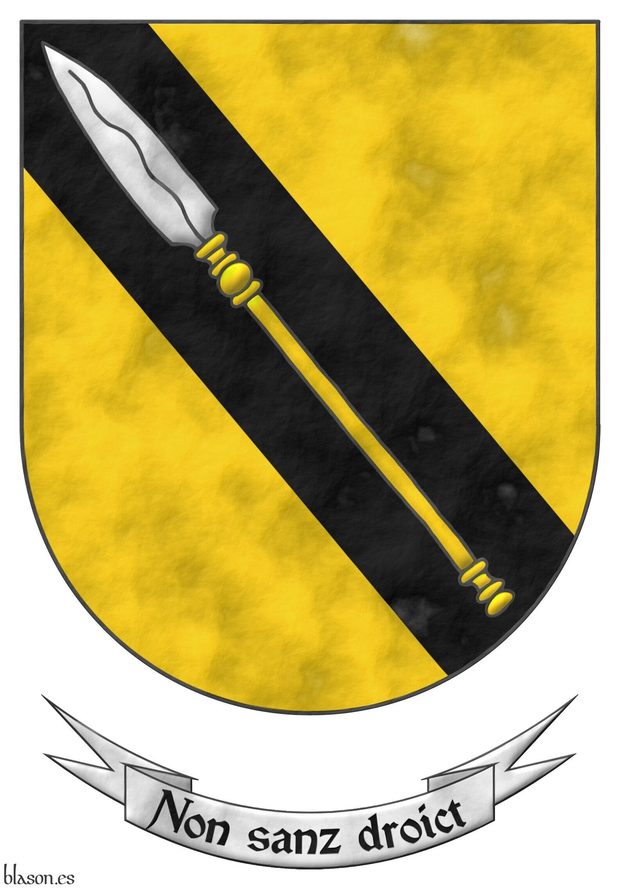
Or, on a bend Sable, a spear Or, steeled Argent. Motto: «Non sanz droict»
Escudo de oro, una banda de sable, cargada de una lanza de plata, fustada oro. Lema: «Non sanz droict».
Coat of arms interpreted with: a semicircular (round) base; field and bend in flat tinctures Or and Sable; a lance with a broad and long iron illuminated in Argent; shaft illuminated in Or; motto in Sable upon a scroll of Argent; and the whole finished with a parchment effect.
Its motto in French «Non sanz droict» means «Not without right» and it is considered a canting (speaking) arm by the pun Spear ~ Shakespeare.
Blazon keywords: Without divisions, Or, Sable, Argent, Bend, Bendwise, Spear and Charged.
Style keywords: Parchment and Illuminated.
Classification: Interpreted, Personal, Coat of arms, Canting and Literature.
Bearer: Shakespeare, William.
-
Language
-
Categories of heraldry
-
Divisions of the field
- Without divisions
- Party per pale
- Party per fess
- Party per bend
- Party per bend sinister
- Tierce
- Tierce sinister
- Tierced per pale
- Tierced per fess
- Tierced per bend
- Tierced pallwise inverted
- Quarterly
- Quarterly per saltire
- Gyronny
- Party per fess, the chief per pale
- Party per pale, the sinister per fess
- Party per fess, the base per pale
- Party per pale, the dexter per fess
- Chapé
- Chaussé
- Embrassé
- Contre-embrassé
- Party per chevron
- Enté
- Enté en point
- Flanched
-
Metals
-
Colours
-
Furs
-
Other tinctures
-
Ordinaries and sub-ordinaries
-
Diminutives of the ordinaries
-
Geometric charges
-
Composite ordinaries
-
Inanimate charges from Nature
Atom, Crescent, Diamond, Emerald, Estoile, Increscent, Lightning flash, Moon, Mount, Mullet, Mullet of four points, Orbital, Plough of Ursa Major, Rainbow, Ray of the sun, River, Sea, Snowflake, Sun, Sun in splendour, Sun of May, Terrestrial globe, Trimount, Water and Wave.
-
Vegetal charges from Nature
Acorn, Apple, Apple tree, Ash, Bluebonnet, Camellia, Chrysanthemum, Cinquefoil, Cornflower, Dogwood flower, Double rose, Eguzki-lore, Elm, Fleur de lis, Flower, Gourd, Holm oak, Hop cone, Indian paintbrush, Kapok tree, Laurel, Lily, Linden, Lotus flower, Madonna lily, Mexican cedar tree, Oak, Olive tree, Palm tree, Plantain plant, Pomegranate, Poplar leaf, Rose, Shamrock, Sunflower, Thistle, Tree, Tulip, Vine and Wheat.
-
Animal charges from Nature
Badger, Bald eagle, Barbel, Barn owl, Bear, Beaver, Bee, Beetle, Bighorn sheep, Binson, Blackbird, Boar, Brach hound, Bull, Cow, Doe, Dog, Dolphin, Dove, Eagle, Elephant, Falcon, Female figure, Fish, Flame, Fly, Fox, Frog, Goat, Goldfinch, Goose, Heron, Horse, Hummingbird, Jaguar, Lark, Leopard, Lion, Lion passant, Lion rampant guardant, Lioness, Lynx, Male figure, Martlet, Merino ram, Owl, Panther, Parrot, Peacock, Pelican, Pelican in her piety, Pronghorn, Puffin, Quetzal, Raven, Roe deer, Rooster, Savage, Seagull, Serpent, She-wolf, Stag, Starling, Talbot, Turtle, Tyger, Vulture, Warren hound and Wolf.
-
Parts of natural charges
Arm, Beak, Branch, Caboshed, Chest, Claw, Covert, Dorsal fin, Eagle claw, Ear of wheat, Ermine spot, Escallop, Feather, Foot (palmiped), Foreleg, Forepaw, Hand, Head, Heart, Hoof, Leaf, Neck, Ostrich feather, Palm frond, Paw, Roe deers' attires, Shoulder, Sprig, Stags' attires, Stem, Swallow-tail, Tail, Tail addorsed, Tail fin, Talon, Tibia, Tooth, Trunk, Trunk (elephant), Two hands clasped, Two wings in vol, Udder, Wing and Wrist.
-
Artificial charges
Ace of spades, Anchor, Anvil, Arch, Arm vambraced, Armillary sphere, Arrow, Axe, Bell, Bell tower, Beret, Bonfire, Book, Bookmark, Bow, Branding iron, Bridge, Broken, Buckle, Cannon, Cannon dismounted, Cannon port, Canopy roof, Carbuncle, Castle, Celtic Trinity knot, Chain, Chess rooks, Church, Clarion, Clay pot, Closed book, Club, Column, Comb, Compass rose, Conductor's baton, Cord, Covered cup, Crozier, Crucible, Cuffed, Cup, Cyclamor, Dagger, Displayed scroll, Double vajra, Drum, Ecclesiastical cap, Fanon, Federschwert, Fleam, Four crescents joined millsailwise, Galician granary, Garb, Gauntlet, Geometric solid, Grenade, Halberd, Hammer, Harp, Host, Hourglass, Key, Key ward, Knight, Knot, Lantern, Letter, Line, Loincloth, Maunch, Menorah, Millrind, Millstone, Millwheel, Monstrance, Mortar, Mullet of six points pierced, Nail, Non-classic artifact, Norman ship, Number, Oar, Oil lamp, Open book, Page, Pair of pliers, Pair of scales, Parchment, Pestle, Piano, Pilgrim's staff, Plough share, Polish winged hussar, Port, Portcullis, Potent, Quill, Ribbon, Rosette of acanthus leaves, Sabre, Sackbut, Sail, Scroll, Scythe, Sheaf of tobacco, Ship, Skirt, Spear, Spear's head, Stairway, Star of David, Step, Sword, Symbol, Tetrahedron, Torch, Tower, Trident, Trumpet, Turret, Two-handed sword, Wagon-wheel, Water-bouget, Wheel, Winnowing fan and With a turret.
-
Immaterial charges
Angel, Archangel, Basilisk, Dragon, Dragon's head, Garuda, Golden fleece, Griffin, Heart enflamed, Justice, Mermaid, Our Lady of Mercy, Ouroboros, Paschal lamb, Pegasus, Phoenix, Sacred Heart of Jesus, Saint George, Sea-griffin, Sea-lion, Trinity, Triton, Unicorn, Winged hand and Wyvern.
-
External elements
-
Heraldic creations
-
References
-
Formats
-
Keywords on this page
Port and windows, Proper, Parchment, Pointed, Armed, Erased, Azure, Bend, Boa, Bordure, Charged, Castle, Crest, Ogee, Crown, Closed royal crown, Crowned, Four, Outlined in sable, Dexter, The eyes, Coat of arms, Scroll, Personal, Gules, Illuminated, Interpreted, Langued, Spear, Barn owl, Motto, Lion, Enflamed, Masoned, Semi-circular, Eight, Or, Argent, Without divisions, Civic, Rampant, Rounded, Kingdom of England, Sable, Sinister, Vert, Socioeconomic, Three and One.

